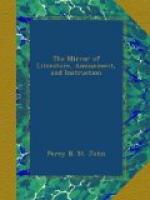The generality of our society on board was respectable, and some of its members were men of education and talent. Excepting that there was no lady of the party, it was composed of the usual materials to be found at the cuddy-table of an outward bound Indiaman. First, there was a puisne judge, intrenched in all the dignity of a dispenser of law to his majesty’s loving subjects beyond the Cape, with a Don’t tell me kind of face, a magisterial air, and dictatorial manner, ever more ready to lay down the law, than to lay down the lawyer. Then, there was a general officer appointed to the staff in India, in consideration of his services on Wimbledon Common and at the Horse Guards, proceeding to teach the art military to the Indian army—a man of gentlemanly but rather pompous manners; who, considering his simple nod equivalent to the bows of half a dozen subordinates, could never swallow a glass of wine at dinner without lumping at least that number of officers or civilians in the invitation to join him, while his aid-de-camp practised the same airs among the cadets. Then, there was a proportion of civilians and Indian officers returning from furlough or sick certificate, with patched-up livers, and lank countenances, from which two winters of their native climate had extracted only just sufficient sunbeams to leave them of a dirty lemon colour. Next, there were a few officers belonging to detachments of king’s troops proceeding to join their regiments in India, looking, of course, with some degree of contempt on their brethren in arms, whose rank was bounded by the longitude of the Cape; but condescending to patronize some of the most gentlemanly of the cadets. These, with a free mariner, and no inconsiderable sprinkling of writers, cadets, and assistant-surgeons, together with the officers of the ship, who dined at the captain’s table, formed a party of about twenty-five.—Twelve Years’ Military Adventure.
* * * * *
EDUCATION IN DENMARK.
Much pains has lately been taken in Denmark to promote the means of elementary education, and Lancasterian schools have been generally established throughout the country. We have now before us the Report made to the king by the Chevalier Abrahamson, of the progress, prospects, and present state of the schools for mutual instruction in Denmark, to the 28th of January, 1828, by which it appears, that 2,371 schools for mutual instruction have been established, and are in full progress, in the different districts of the kingdom and in the army.—North American Review.
* * * * *




